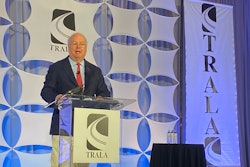
Earning government business isn’t about price. It’s about earning trust, says Derek Berning, president of Midwest Bus Parts.
His company provides aftermarket school bus parts. Probably around 40% of his business is with school districts, Berning says, which are controlled by boards that approve budgets. The gap between those boards and the people who actually need the parts can be huge.
Getting in the door
“It almost always starts at the ground level, where you have to earn their trust to get in the door,” Berning says. He usually starts with a district’s mechanic or parts purchaser.
“Go in directly through the shop doors, not the front door, and ask for the person who orders parts, then shake their hand,” Berning says. And donuts or cookies always helps.
Once a relationship is established, Berning says the district contact will lobby its director, who will talk to their boss, and so on up the chain until the company earns a purchase order for the school year.
Berning says the school bus business usually runs the entire school year, with districts or garages sending a blanket purchase order for a certain amount. They can then do that amount of business with the parts provider, increasing it if they need it and feel the company earned the business.
“It’s a slow process,” Berning says. But one that pays off. His company started working with the Minneapolis school district with a purchase order for $5,000. It’s now around $100,000.
“Each year, the trust grows.”
Luke Todd, president of The Service Company, works with local schools, municipalities, fire departments and county garages. He finds work by registering on city websites that offer bid alerts when new bids are available.
“This allows us to look at a city’s needs and make a decision if we would like to bid on the opportunity,” Todd says. “We service several different districts and provide a variety of work.”
Bidding on business
Most government agencies do business by publishing requests for proposals (RFPs). Berning says the RFP process varies from agency to agency, or in his case, from district to district.
He says the packet or application usually includes the agency’s needs and instructions for completing the RFP. The agency may ask for things such as the list price of any parts requested, any discounts you’re offering, delivery time, stocking quantity and other such information.
Success with one government entity can cascade as well, says Todd, who in the past has received more work because of his reputation among agencies.
“Different departments communicate. If you are doing a great job for a certain entity, they are likely to pass that on to their colleagues, which in turn can result in you being invited to bid on an opportunity,” Todd says. “Our experience with government customers is the same as the rest of our customers — service and communication is key.”
Toni Nastali, owner of Spring Align in Illinois, says she works on fire trucks and ambulances. Having been in business for more than 70 years, she says she doesn’t even maintain an outside sales staff.
“I am WBE (women-owned business) certified, and they find me,” she says.
Nastali says the certification is with the city of Chicago; Cook County, Illinois; and with the state of Illinois. It’s a rigorous process, she says.
“These agencies look at business financials, personal financials, shop locations, inventory, equipment, etc., to confirm the viability of your business,” Nastali says.
Some agencies have regulations that require so much business to go to women- or minority-owned businesses. They consult the certification rolls to find companies that fit the bill.
Customer service matters
Once a contract is signed, Nastali says prompt service can keep the agencies coming.
“Let your reputation precede you,” she advises.
Berning says in his business, reputation is worth more to his government customers than low price.
“If you can offer a competitive price, they’ll let you in the door. But that’s not what earns the business,” he says. That’s more about prompt service and managing the parts inventory so frequently needed parts are on hand, including ones that are specific to government fleets and specialty vehicles, such as buses, firetrucks and ambulances.
Berning says he has a large inventory managed by top-notch parts employees. They keep fast-movers stocked and strategically grow their inventory along with their revenues and it’s all well managed so they can get to any part, anywhere.
“You’ve got to have clarity there,” he says. “If you’ve got clarity in-house, you can offer that to your customer.”
Todd says clear communication is also important to keeping his government clients happy.
“Even if you have a bid or contract, most contracts have exclusions that allow the government customer to choose alternate sources if the service or product is not being provided in a satisfactory manner,” he says. “So, as always take care of your customers, listen to their feedback and do your best to meet their needs.”









